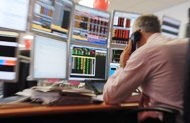European stocks climb on eurozone pact
 London's FTSE 100 index added 0.20 per cent to 5,314.09 points in early trade, the Paris CAC 40 gained 0.23 per cent to 3,102.55 points and Frankfurt's DAX 30 was up 0.17 per cent to 5,685.72 points.
London's FTSE 100 index added 0.20 per cent to 5,314.09 points in early trade, the Paris CAC 40 gained 0.23 per cent to 3,102.55 points and Frankfurt's DAX 30 was up 0.17 per cent to 5,685.72 points.
Elsewhere, the Madrid stock market rose 0.37 per cent and Milan added 0.98 per cent, despite news before the weekend that Fitch had cut its ratings on Spain and Italy amid concern over the debt-laden nations.
Dexia shares were suspended in Paris and Brussels, after Belgium, France and Luxembourg rushed to the rescue of Dexia, splitting up the lender as other European banks braced for a eurozone recapitalisation plan.
French President Nicolas Sarkozy and German Chancellor Angela Merkel put on a united front Sunday and vowed after talks in Berlin a response to Europe's debt crisis within weeks.
Without announcing concrete details, Sarkozy said there would be "lasting, global and quick responses before the end of the month" amid growing fears of another crippling global credit crunch.
The announcement comes a few weeks ahead of a G20 summit in Cannes and Sarkozy said Europe must "arrive at the (meeting) united and with the problems resolved."
Analysts said that the news helped drive cash towards assets that are deemed a riskier bet, such as equities and the euro.
"Risk assets are in a positive territory this morning after shrugging off the downgrade of Italy and Spain by credit rating agency Fitch after the close on Friday," said Kathleen Brooks at trading site Forex.com.
"Stocks have been driven higher by expectations of an accord between France and Germany and a concrete deadline -- the end of October -- to get a comprehensive plan together to re-capitalise the banking sector and fundamentally overhaul the economic workings of the currency bloc."
The European single currency rallied to $1.3525 in morning London foreign exchange deals from $1.3375 in New York late Friday.
"The positive tone in risk sentiment can persist for a while longer for now," said analyst Stephen Gallo at Schneider FX.
"Absent the 'Merkozy' headlines concerning an end-October deadline for bank recapitalisation plans and anti-contagion measures over the weekend, we would almost certainly have been witnessing the euro under downward pressure."
The meeting came amid concerns that France and Germany, the two main powerhouses of the eurozone, were at odds over the best way to recapitalise the region's banks.
Germany wants banks that are under pressure to turn to investors for funds before appealing for national or European cash.
It wants the EU's 440-billion-euro ($589-billion) European Financial Stability Facility (EFSF) bailout fund to intervene only as a last resort.
But France, fearful of losing its top-notch AAA credit rating, would rather dip into European funds than its own coffers.
Some commmentators doubted whether the Franco-German pact would resolve the eurozone's raging debt crisis, which has already resulted in vast EU-IMF bailouts for Greece, Ireland and Portugal.
"It looks like a false to dawn to me," said Daiwa economist Chris Scicluna told AFP.
"The Merkel-Sarkozy meeting was of little consequence and it is clear that Germany and France still disagree on many of the key policy issues to be resolved.
"At the same time ... sovereign ratings downgrades for Spain and Italy, together with the news that the takeover of Dexia will cost the Belgian authorities 4.0 billion euros, provide reminders that, beneath (the) surface, financial fragilities remain.
"And with overal economic growth having all but come to a halt, and possibly shift into reverse, this could be the calm before the storm."
Belgium agreed to pay 4.0 billion euros ($5.36 billion) for Dexia's domestic consumer-lending unit. It was the second time in three years that Dexia needed to be rescued and comes just three months after it passed EU stress tests.
Meanwhile, British Prime Minister David Cameron warned that "time was short" for eurozone leaders to solve the region's debt crisis and urged them to adopt a "big bazooka" approach, in an interview with the Financial Times.
"Time is short, the situation is precarious," Cameron told the newspaper, adding that a comprehensive plan was required to avert economic disaster.
Asian shares were mixed Monday, after starting on a high in response to the Franco-German meeting. Sydney added 0.92 per cent, Seoul 0.38 per cent and Singapore 0.61 per cent, while Hong Kong finished flat and Shanghai lost 0.61 per cent in the first trading day after the week-long Golden Week holiday. Tokyo and Taipei were closed for public holidays.
What the stars mean:
★ Poor ★ ★ Promising ★★★ Good ★★★★ Very good ★★★★★ Exceptional
Related Contents
Latest News
More News
- Cashless payments hit 28 times GDP in 2025 (February 04, 2026 | 18:09)
- SSIAM and DBJ launch Japan Vietnam Capital Fund (February 04, 2026 | 15:57)
- Banks target stronger profits, credit growth in 2026 (February 04, 2026 | 15:43)
- Vietnam on path to investment-grade rating (February 03, 2026 | 13:07)
- Consumer finance sector posts sharp profit growth (February 03, 2026 | 13:05)
- Insurance market building the next chapter of protection (February 02, 2026 | 11:16)
- NAB Innovation Centre underscores Vietnam’s appeal for tech investment (January 30, 2026 | 11:16)
- Vietnam strengthens public debt management with World Bank and IMF (January 30, 2026 | 11:00)
- Corporate bond market poised for stronger growth cycle (January 28, 2026 | 17:13)
- Vietnam's IPO market on recovery trajectory (January 28, 2026 | 17:04)

 Tag:
Tag:




















 Mobile Version
Mobile Version